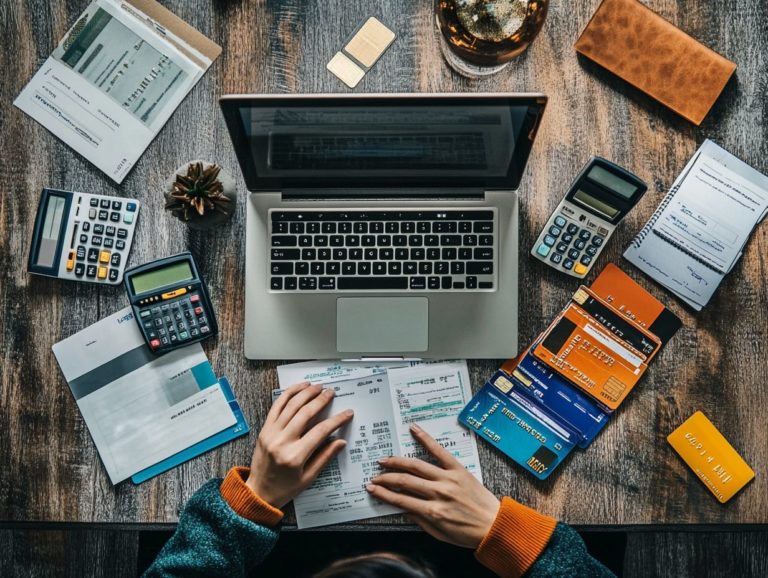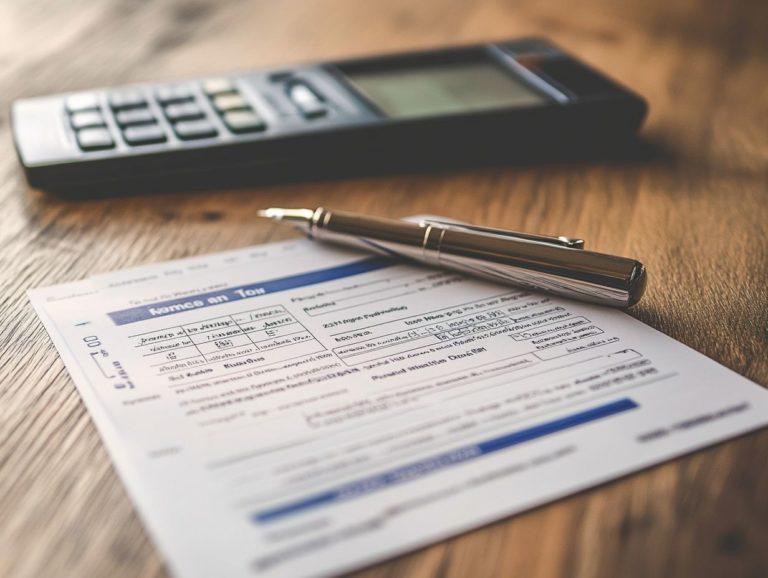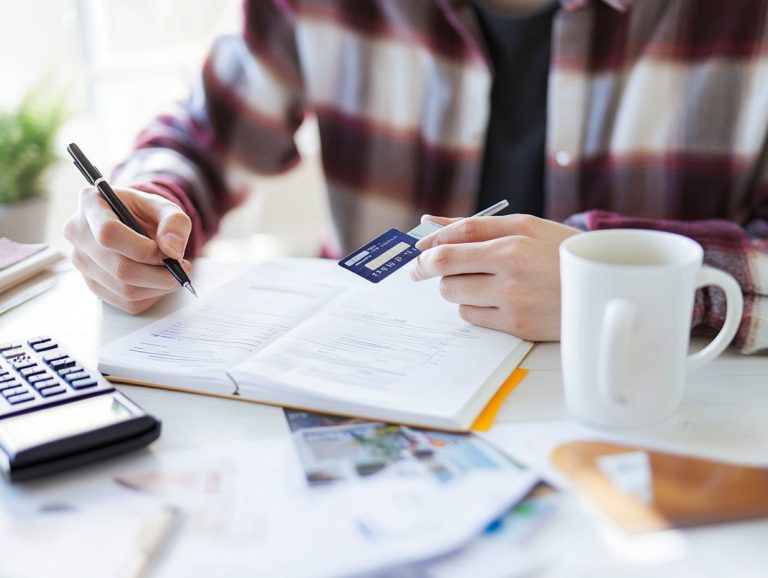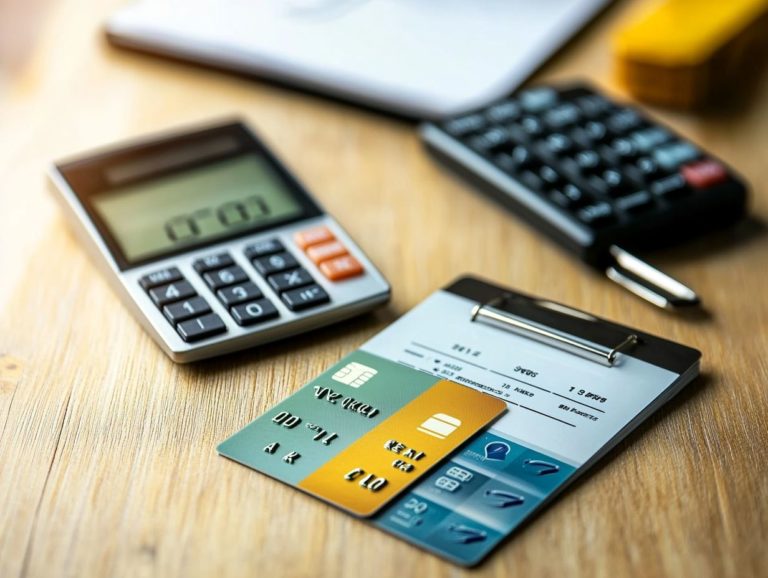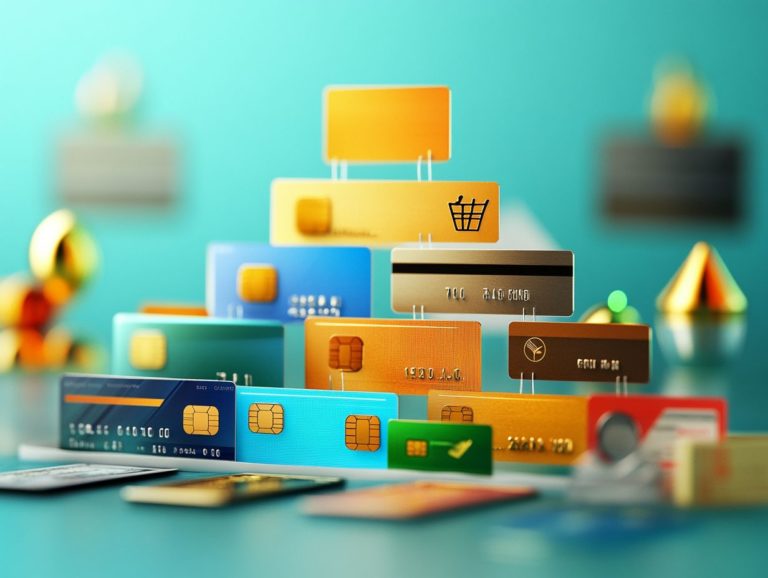How to Use Credit Cards to Build an Emergency Fund
Building an emergency fund is a vital step toward achieving financial stability, serving as a safety net for those unexpected expenses that life throws your way.
You ll be amazed to discover that credit cards can actually play a supportive role in this process.
This article delves into the significance of having an emergency fund while also examining the benefits and risks of utilizing credit cards to help establish one.
From selecting the right card to implementing effective saving strategies, you’ll acquire the insights needed to build and maintain a robust financial cushion.
Let s embark on this journey toward financial security together!
Contents
- Key Takeaways:
- The Importance of an Emergency Fund
- Using Credit Cards to Build an Emergency Fund
- Choosing the Right Credit Card for Your Emergency Fund
- Strategies for Building an Emergency Fund with Credit Cards
- Managing Credit Card Debt While Building an Emergency Fund
- How to Avoid Overspending and Accumulating Debt
- Tips for Maintaining and Growing Your Emergency Fund
- Frequently Asked Questions
- What is an emergency fund and why is it important to have one?
- How can credit cards be used to build an emergency fund?
- What type of credit card should I use to build an emergency fund?
- How much should I aim to save in my emergency fund?
- What are some tips for building and maintaining an emergency fund using credit cards?
- Are there any potential risks or drawbacks to using credit cards to build an emergency fund?
Key Takeaways:
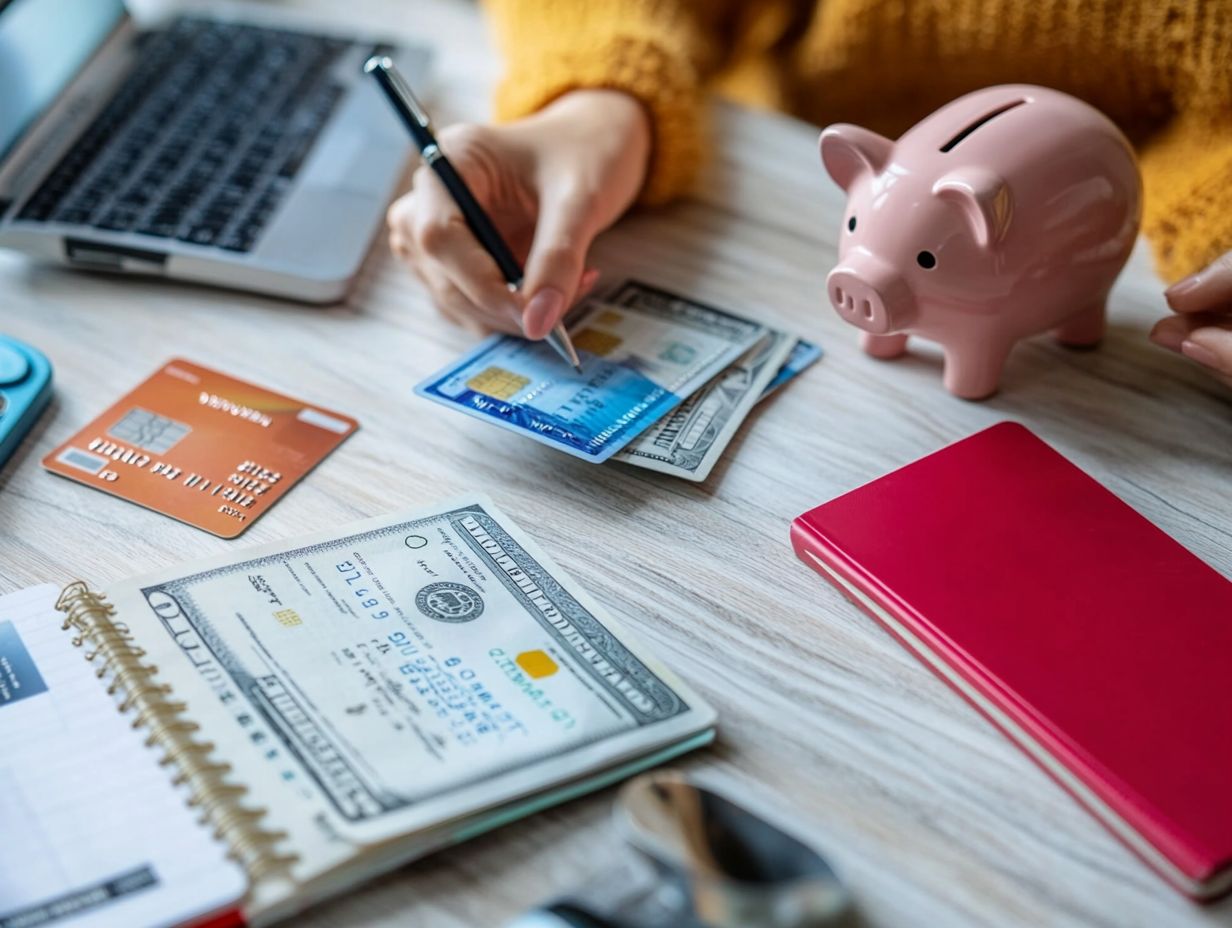
- Having an emergency fund is crucial for financial stability and peace of mind.
- Credit cards can be a useful tool for building an emergency fund, but they come with potential risks.
- When choosing a credit card for your emergency fund, consider factors such as interest rates, rewards, and fees.
The Importance of an Emergency Fund
An emergency fund serves as an essential financial safety net, giving you the power to tackle unexpected expenses and financial shocks without succumbing to debt. It acts as your cash reserve for those unplanned bills think medical emergencies, car repairs, or home maintenance providing you with peace of mind and stability.
By prioritizing your savings planning and cultivating a robust saving habit, you can ensure you re well-prepared for any unforeseen circumstances life may throw your way. This ultimately enhances your financial well-being.
Why You Need to Have One
Having an emergency fund is vital for your financial stability, serving as a safeguard against unexpected expenses that could potentially lead to a crisis.
This fund allows you to manage your money flow seamlessly during unforeseen events like medical emergencies, car repairs, or even job loss. By covering these urgent costs without the need for high-interest loans loans that charge a lot of interest you can effectively avoid the relentless cycle of credit card debt that ensnares so many.
Taking this proactive approach ensures that essential expenses such as bills and living costs are addressed promptly, granting you peace of mind. The security that comes from having an emergency fund fosters a healthier financial lifestyle, giving you the power to navigate life s unpredictability with unwavering confidence.
Using Credit Cards to Build an Emergency Fund
Building your emergency fund with credit cards offers exciting benefits, but be aware of the risks!
Utilizing credit cards can be a savvy approach to building an emergency fund, as long as you grasp the delicate balance between the benefits and risks inherent in financial planning.
By navigating this landscape wisely, you can maximize the advantages while minimizing potential pitfalls.
Benefits and Risks
Using credit cards to build an emergency fund presents a mix of enticing benefits and potential risks that you should carefully weigh. For more insights, check out this guide on how to use your credit card for daily expenses to help steer clear of financial pitfalls.
On one hand, leveraging credit cards can work wonders for enhancing your credit score over time, a crucial factor when you aim to secure loans with favorable terms in the future. Many credit cards come equipped with appealing rewards programs, allowing you to earn cash back, travel points, or other perks with your everyday purchases.
This kind of flexibility proves invaluable when unexpected financial emergencies arise, providing you with immediate access to funds. However, it s equally important to stay vigilant about the risks tied to credit card use, such as the danger of accumulating debt and facing high-interest rates if you don t pay off your balances in full.
To navigate these challenges effectively, consider implementing strategies like setting a budget, using automatic payments, and keeping a close watch on your spending habits. By following these tips, you can enjoy the perks of credit cards without the stress!
Choosing the Right Credit Card for Your Emergency Fund
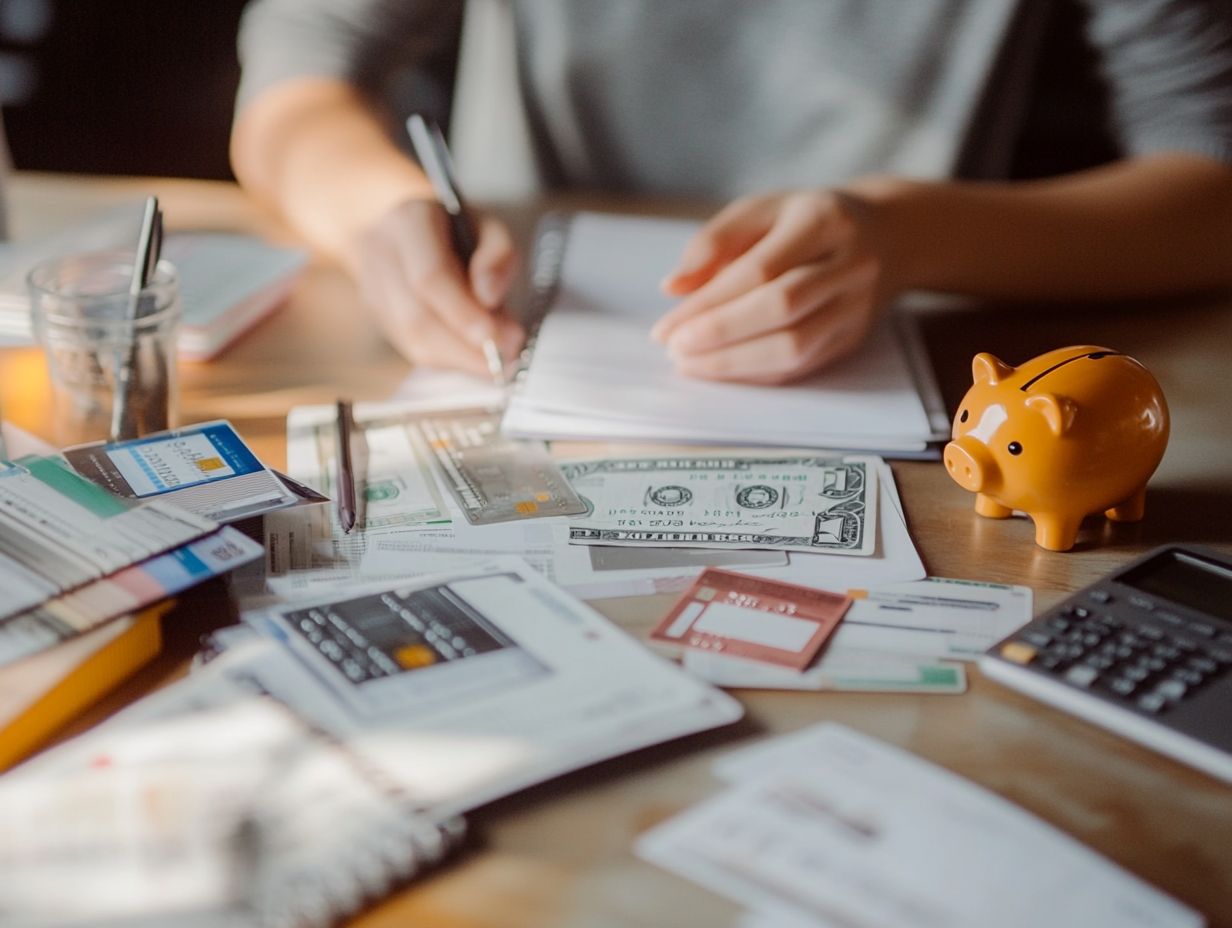
Choosing the ideal credit card to help you build your emergency fund requires thoughtful consideration of several key factors. You ll want to evaluate interest rates, explore rewards programs, and assess credit limits.
Factors to Consider
- Interest rates
- Rewards programs
- Fees
- Credit limits
The cost of borrowing can significantly influence your overall financial strategy. Higher interest rates lead to larger repayments over time. By opting for a card with a lower rate, you can free up more funds for contributions to your savings.
Many credit cards come with rewards programs that allow you to earn cash back or points. You can redirect these earnings toward enhancing your emergency fund. By considering these factors, along with any annual fees or promotional offers, you can make a well-informed decision that addresses your immediate spending needs and supports your long-term financial health.
Strategies for Building an Emergency Fund with Credit Cards
You can boost your financial security by using smart strategies with credit cards. By adopting disciplined saving practices and careful planning, you can minimize risk while ensuring you re prepared for unexpected expenses.
Setting Up Automatic Payments
Setting up automatic payments for your emergency fund can truly transform your saving process. It helps you cultivate a consistent savings habit.
By automating the transfer of a predetermined amount to a dedicated savings account, you eliminate the temptation to splurge on non-essential items. This approach protects your savings and fosters discipline in your financial management.
Knowing that your money is earmarked for emergencies can significantly reduce stress and bring you peace of mind during uncertain times. Embracing this strategy is a proactive move towards financial security.
It ensures that when unexpected expenses pop up, you have a reliable cushion to lean on. This makes your journey to financial stability that much smoother.
Maximizing Rewards and Cash Back
Maximizing rewards and cash back from your credit card can play a pivotal role in establishing a robust emergency fund.
By looking into the various credit card rewards programs available, you can earn points or cash back on everyday purchases. Channel those earnings directly into your savings.
- Cards offering enticing travel rewards
- Cards with straightforward cash back benefits
It s essential to assess which options yield the highest returns. Navigating the redemption process allows you to turn rewards into tangible savings for unexpected expenses.
With thoughtful planning in selecting the right card and astute management of your rewards, you can cultivate a financial cushion that helps secure your financial future.
Managing Credit Card Debt While Building an Emergency Fund
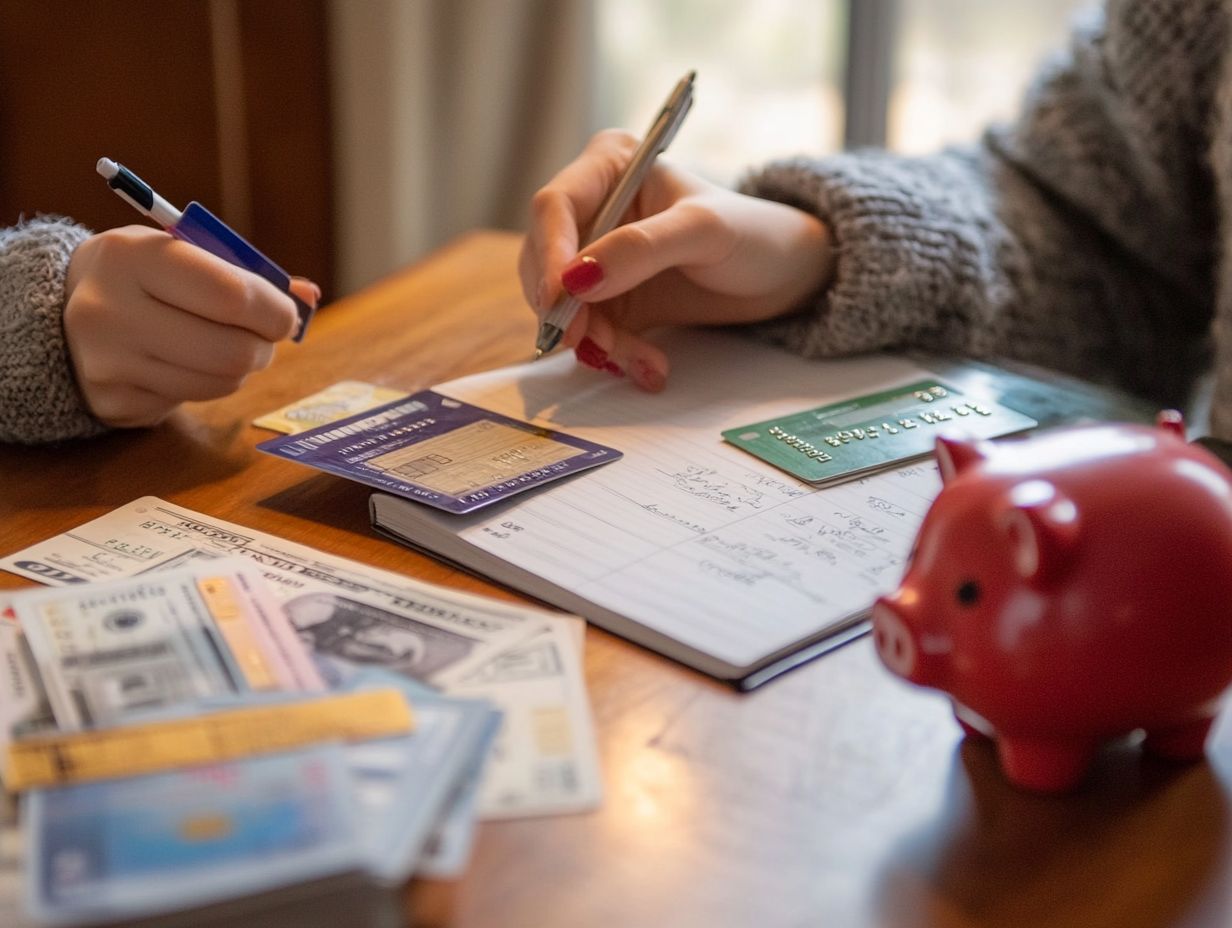
Effectively managing credit card debt while simultaneously building an emergency fund is essential for achieving financial stability. Act quickly to manage your debts while building your emergency fund.
How to Avoid Overspending and Accumulating Debt
Avoiding overspending and accumulating credit card debt is crucial for protecting your emergency fund and maintaining your financial health.
Implement these strategies to cut unnecessary expenses and build your emergency fund. Create a structured budget that accounts for all your fixed costs and variable expenses. By setting clear spending limits and sticking to them, you’ll track your financial habits more effectively.
Distinguishing between needs and wants will empower you to prioritize essential purchases over impulsive buys that can derail your plans.
By adopting these methods, you won t just cut costs; you ll also foster the growth of a robust emergency fund. This approach lays a solid foundation for money stability, equipping you to navigate unforeseen circumstances with confidence.
Tips for Maintaining and Growing Your Emergency Fund
Maintaining and growing your emergency fund is essential for securing your long-term financial health and preparing for unexpected challenges that life may throw your way.
Best Practices for Saving and Using Your Fund
Implementing best practices for saving and utilizing your emergency fund can significantly enhance its effectiveness. Establish clear guidelines for when to access the fund, helping you resist the temptation to dip into your savings for non-urgent expenses.
This discipline can be strengthened by setting a monthly savings goal to consistently contribute to the fund. Exploring low-risk investment options can also help your fund grow over time, amplifying its potential during genuine financial crises.
These strategies boost your money stability and help you feel secure in times of uncertainty, equipping you to better tackle unexpected challenges.
Frequently Asked Questions
What is an emergency fund and why is it important to have one?
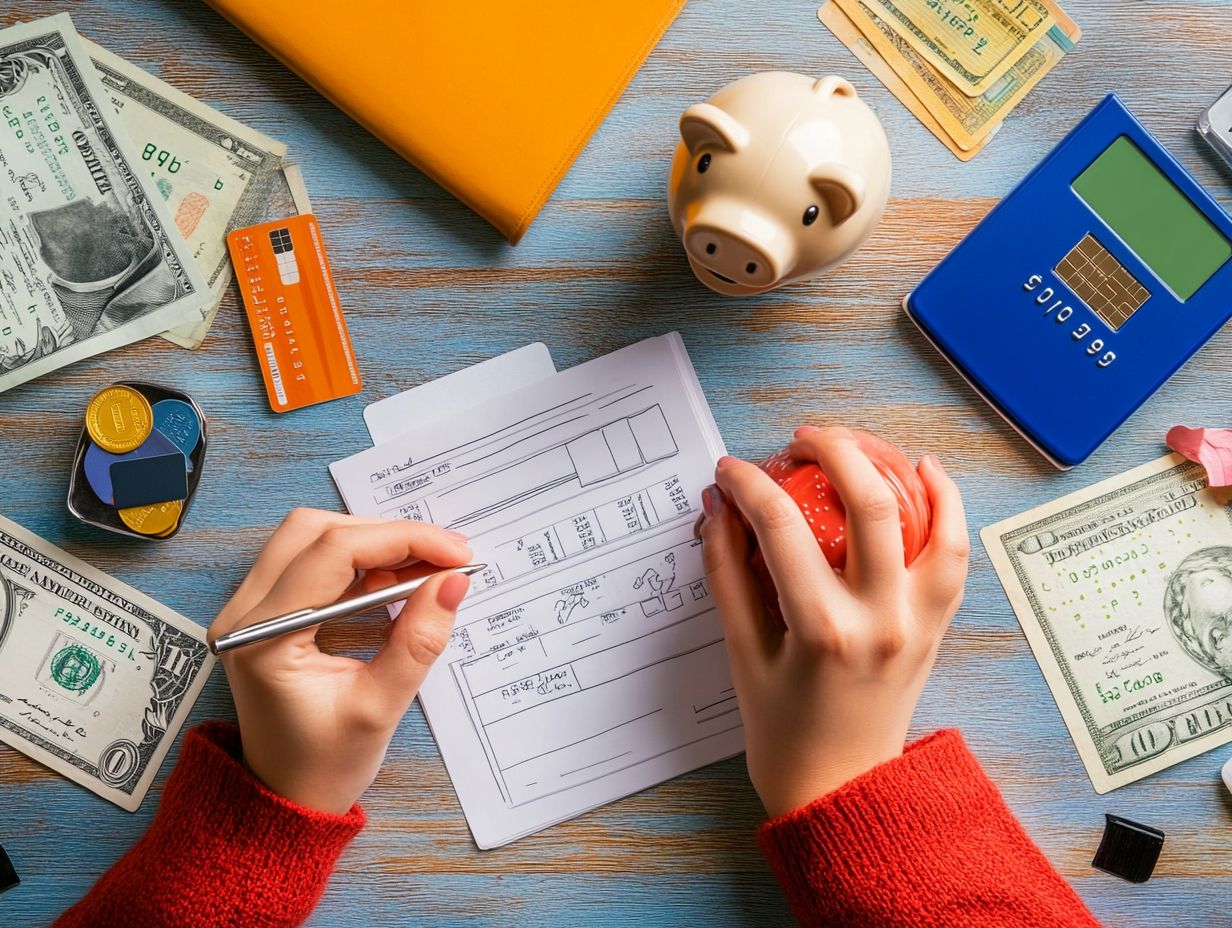
An emergency fund is a savings account specifically designated for unexpected expenses or financial emergencies. It acts as a safety net to help cover unforeseen costs such as medical bills, car repairs, or job loss. Having an emergency fund is crucial to avoid going into debt or relying on high-interest credit cards for these unexpected expenses.
How can credit cards be used to build an emergency fund?
Credit cards can serve as a tool to build an emergency fund by leveraging cash back or rewards programs. By using a credit card for everyday purchases and paying off the balance in full each month, you can accumulate cash back or rewards points that can be redeemed for cash or gift cards. This extra money can then be deposited into your emergency fund, highlighting the benefits of credit cards during emergencies.
What type of credit card should I use to build an emergency fund?
When using credit cards to build an emergency fund, choose a card with a low-interest rate and no annual fees. This ensures that if you need to carry a balance, you won’t incur excessive interest or fees. Additionally, you can learn how to use your credit card for budgeting and look for cards with cash back or rewards programs to maximize your savings.
How much should I aim to save in my emergency fund?
The general rule of thumb is to have enough money in your emergency fund to cover 3-6 months of living expenses. Calculate your necessary expenses such as rent, utilities, groceries, and insurance and multiply that by the number of months you want covered. For instance, if your monthly expenses are $3,000, aim to have $9,000-$18,000 in your emergency fund.
What are some tips for building and maintaining an emergency fund using credit cards?
One tip is to have a separate credit card designated specifically for emergency fund deposits, using it only for that purpose. This helps you keep track of your savings and avoid overspending. It s also important to make regular contributions to your emergency fund, even if it’s just a small amount each month. Lastly, avoid using your emergency fund for non-urgent expenses, as this can deplete your savings and defeat the purpose of having it in the first place.
Start budgeting today and watch your emergency fund grow!
Are there any potential risks or drawbacks to using credit cards to build an emergency fund?
Using credit cards to build an emergency fund can lead to a big risk: spending too much and getting into debt. Charge only what you can afford to pay off in full each month.
Relying on credit cards isn t the best way to save for emergencies. If you often act on impulse, this method might not suit you.

